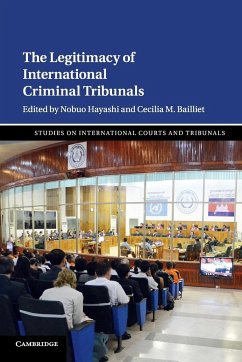The Legitimacy of International Criminal Tribunals
Herausgeber: Bailliet, Cecilia M.; Hayashi, Nobuo
The Legitimacy of International Criminal Tribunals
Herausgeber: Bailliet, Cecilia M.; Hayashi, Nobuo
- Broschiertes Buch
- Merkliste
- Auf die Merkliste
- Bewerten Bewerten
- Teilen
- Produkt teilen
- Produkterinnerung
- Produkterinnerung
This multidisciplinary volume investigates the challenge of attaining legitimacy by international criminal courts and tribunals.
Andere Kunden interessierten sich auch für
![The Legitimacy of International Criminal Tribunals The Legitimacy of International Criminal Tribunals]() The Legitimacy of International Criminal Tribunals152,99 €
The Legitimacy of International Criminal Tribunals152,99 €![The Legitimacy of International Trade Courts and Tribunals The Legitimacy of International Trade Courts and Tribunals]() The Legitimacy of International Trade Courts and Tribunals126,99 €
The Legitimacy of International Trade Courts and Tribunals126,99 €![The Legitimacy of International Trade Courts and Tribunals The Legitimacy of International Trade Courts and Tribunals]() The Legitimacy of International Trade Courts and Tribunals48,99 €
The Legitimacy of International Trade Courts and Tribunals48,99 €![The Legacy of Ad Hoc Tribunals in International Criminal Law The Legacy of Ad Hoc Tribunals in International Criminal Law]() The Legacy of Ad Hoc Tribunals in International Criminal Law102,99 €
The Legacy of Ad Hoc Tribunals in International Criminal Law102,99 €![The Performance of International Courts and Tribunals The Performance of International Courts and Tribunals]() The Performance of International Courts and Tribunals141,99 €
The Performance of International Courts and Tribunals141,99 €![Fraudulent Evidence Before Public International Tribunals Fraudulent Evidence Before Public International Tribunals]() Michael ReismanFraudulent Evidence Before Public International Tribunals94,99 €
Michael ReismanFraudulent Evidence Before Public International Tribunals94,99 €![European Consensus and the Legitimacy of the European Court of Human Rights European Consensus and the Legitimacy of the European Court of Human Rights]() Kanstantsin DzehtsiarouEuropean Consensus and the Legitimacy of the European Court of Human Rights101,99 €
Kanstantsin DzehtsiarouEuropean Consensus and the Legitimacy of the European Court of Human Rights101,99 €-
-
-
This multidisciplinary volume investigates the challenge of attaining legitimacy by international criminal courts and tribunals.
Hinweis: Dieser Artikel kann nur an eine deutsche Lieferadresse ausgeliefert werden.
Hinweis: Dieser Artikel kann nur an eine deutsche Lieferadresse ausgeliefert werden.
Produktdetails
- Produktdetails
- Verlag: Cambridge University Press
- Seitenzahl: 524
- Erscheinungstermin: 22. Februar 2018
- Englisch
- Abmessung: 229mm x 152mm x 29mm
- Gewicht: 750g
- ISBN-13: 9781316509401
- ISBN-10: 1316509400
- Artikelnr.: 51380404
- Herstellerkennzeichnung
- Libri GmbH
- Europaallee 1
- 36244 Bad Hersfeld
- gpsr@libri.de
- Verlag: Cambridge University Press
- Seitenzahl: 524
- Erscheinungstermin: 22. Februar 2018
- Englisch
- Abmessung: 229mm x 152mm x 29mm
- Gewicht: 750g
- ISBN-13: 9781316509401
- ISBN-10: 1316509400
- Artikelnr.: 51380404
- Herstellerkennzeichnung
- Libri GmbH
- Europaallee 1
- 36244 Bad Hersfeld
- gpsr@libri.de
Introduction Nobuo Hayashi, Cecelia M. Bailliet and Joanna Nicholson; Part
I. Theories and Perspectives: 1. The legitimacy of international criminal
tribunals Larry May and Shannon Fyfe; 2. Conceptualising and measuring the
legitimacy of international criminal tribunals Silje Aambø Langvatn and
Theresa Squatrito; 3. Between international criminal justice and injustice:
theorising legitimacy Sergey Vasiliev; 4. Legitimacy, legality, and the
possibility of a pluralist international criminal law Asad Kiyani; 5. The
legitimacy and effectiveness of international criminal tribunals: a
criminal policy perspective Athanasios Chouliaras; Part II. Norms and
Objectives: 6. Legitimacy and ICC jurisdiction following Security Council
referrals: conduct on the territory of non-Party States and the legality
principle Rogier Bartels; 7. Is the Yugoslav Tribunal guilty of
hyper-humanising international humanitarian law? Nobuo Hayashi; 8. 'One of
the challenges that can plausibly be raised against them'? On the role of
truth in debates about the legitimacy of international criminal tribunals
Jakob V. H. Holtermann; 9. Hidden legitimacy: crafting judicial narratives
in the shadow of secrecy at a war crimes tribunal - a speculation Timothy
William Waters; Part III. Complementarity and Regionalism: 10. Positive
complementarity and legitimacy - is the International Criminal Court
shifting from judicial restraint towards intervention? Ignaz Stegmiller;
11. African supranational criminal jurisdiction: one step towards ending
impunity or two steps backwards for international criminal justice? Dorothy
Makaza; 12. Legitimacy defects and legal flaws of the Special Tribunal for
Lebanon: dilemmas of the 'peace through justice' theorem Martin Wählisch;
Part IV. Parties to the Proceedings: 13. Prosecutors' opening statements:
the rhetoric of law, politics and silent war Damien Rogers; 14.
Effectiveness of international criminal tribunals: empirical assessment of
rehabilitation as sentencing goal Barbora Hola, Jessica Kelder and Joris
van Wijk; 15. Procedural justice, legitimacy, and victim participation in
Uganda Stephen Smith Cody; Part V. States and NGOs: 16. Things fall apart:
battles of legitimation and the politics of noncompliance and African
sovereignty from the Rwanda tribunal to the ICC Victor Peskin; 17.
Financing lady justice: how the funding systems of ad hoc tribunals could
lend themselves to the possibility of judicial bias Mistale Taylor; 18.
Claiming authority in the name of the other: human rights NGOs and the ICC
Kjersti Lohne.
I. Theories and Perspectives: 1. The legitimacy of international criminal
tribunals Larry May and Shannon Fyfe; 2. Conceptualising and measuring the
legitimacy of international criminal tribunals Silje Aambø Langvatn and
Theresa Squatrito; 3. Between international criminal justice and injustice:
theorising legitimacy Sergey Vasiliev; 4. Legitimacy, legality, and the
possibility of a pluralist international criminal law Asad Kiyani; 5. The
legitimacy and effectiveness of international criminal tribunals: a
criminal policy perspective Athanasios Chouliaras; Part II. Norms and
Objectives: 6. Legitimacy and ICC jurisdiction following Security Council
referrals: conduct on the territory of non-Party States and the legality
principle Rogier Bartels; 7. Is the Yugoslav Tribunal guilty of
hyper-humanising international humanitarian law? Nobuo Hayashi; 8. 'One of
the challenges that can plausibly be raised against them'? On the role of
truth in debates about the legitimacy of international criminal tribunals
Jakob V. H. Holtermann; 9. Hidden legitimacy: crafting judicial narratives
in the shadow of secrecy at a war crimes tribunal - a speculation Timothy
William Waters; Part III. Complementarity and Regionalism: 10. Positive
complementarity and legitimacy - is the International Criminal Court
shifting from judicial restraint towards intervention? Ignaz Stegmiller;
11. African supranational criminal jurisdiction: one step towards ending
impunity or two steps backwards for international criminal justice? Dorothy
Makaza; 12. Legitimacy defects and legal flaws of the Special Tribunal for
Lebanon: dilemmas of the 'peace through justice' theorem Martin Wählisch;
Part IV. Parties to the Proceedings: 13. Prosecutors' opening statements:
the rhetoric of law, politics and silent war Damien Rogers; 14.
Effectiveness of international criminal tribunals: empirical assessment of
rehabilitation as sentencing goal Barbora Hola, Jessica Kelder and Joris
van Wijk; 15. Procedural justice, legitimacy, and victim participation in
Uganda Stephen Smith Cody; Part V. States and NGOs: 16. Things fall apart:
battles of legitimation and the politics of noncompliance and African
sovereignty from the Rwanda tribunal to the ICC Victor Peskin; 17.
Financing lady justice: how the funding systems of ad hoc tribunals could
lend themselves to the possibility of judicial bias Mistale Taylor; 18.
Claiming authority in the name of the other: human rights NGOs and the ICC
Kjersti Lohne.
Introduction Nobuo Hayashi, Cecelia M. Bailliet and Joanna Nicholson; Part
I. Theories and Perspectives: 1. The legitimacy of international criminal
tribunals Larry May and Shannon Fyfe; 2. Conceptualising and measuring the
legitimacy of international criminal tribunals Silje Aambø Langvatn and
Theresa Squatrito; 3. Between international criminal justice and injustice:
theorising legitimacy Sergey Vasiliev; 4. Legitimacy, legality, and the
possibility of a pluralist international criminal law Asad Kiyani; 5. The
legitimacy and effectiveness of international criminal tribunals: a
criminal policy perspective Athanasios Chouliaras; Part II. Norms and
Objectives: 6. Legitimacy and ICC jurisdiction following Security Council
referrals: conduct on the territory of non-Party States and the legality
principle Rogier Bartels; 7. Is the Yugoslav Tribunal guilty of
hyper-humanising international humanitarian law? Nobuo Hayashi; 8. 'One of
the challenges that can plausibly be raised against them'? On the role of
truth in debates about the legitimacy of international criminal tribunals
Jakob V. H. Holtermann; 9. Hidden legitimacy: crafting judicial narratives
in the shadow of secrecy at a war crimes tribunal - a speculation Timothy
William Waters; Part III. Complementarity and Regionalism: 10. Positive
complementarity and legitimacy - is the International Criminal Court
shifting from judicial restraint towards intervention? Ignaz Stegmiller;
11. African supranational criminal jurisdiction: one step towards ending
impunity or two steps backwards for international criminal justice? Dorothy
Makaza; 12. Legitimacy defects and legal flaws of the Special Tribunal for
Lebanon: dilemmas of the 'peace through justice' theorem Martin Wählisch;
Part IV. Parties to the Proceedings: 13. Prosecutors' opening statements:
the rhetoric of law, politics and silent war Damien Rogers; 14.
Effectiveness of international criminal tribunals: empirical assessment of
rehabilitation as sentencing goal Barbora Hola, Jessica Kelder and Joris
van Wijk; 15. Procedural justice, legitimacy, and victim participation in
Uganda Stephen Smith Cody; Part V. States and NGOs: 16. Things fall apart:
battles of legitimation and the politics of noncompliance and African
sovereignty from the Rwanda tribunal to the ICC Victor Peskin; 17.
Financing lady justice: how the funding systems of ad hoc tribunals could
lend themselves to the possibility of judicial bias Mistale Taylor; 18.
Claiming authority in the name of the other: human rights NGOs and the ICC
Kjersti Lohne.
I. Theories and Perspectives: 1. The legitimacy of international criminal
tribunals Larry May and Shannon Fyfe; 2. Conceptualising and measuring the
legitimacy of international criminal tribunals Silje Aambø Langvatn and
Theresa Squatrito; 3. Between international criminal justice and injustice:
theorising legitimacy Sergey Vasiliev; 4. Legitimacy, legality, and the
possibility of a pluralist international criminal law Asad Kiyani; 5. The
legitimacy and effectiveness of international criminal tribunals: a
criminal policy perspective Athanasios Chouliaras; Part II. Norms and
Objectives: 6. Legitimacy and ICC jurisdiction following Security Council
referrals: conduct on the territory of non-Party States and the legality
principle Rogier Bartels; 7. Is the Yugoslav Tribunal guilty of
hyper-humanising international humanitarian law? Nobuo Hayashi; 8. 'One of
the challenges that can plausibly be raised against them'? On the role of
truth in debates about the legitimacy of international criminal tribunals
Jakob V. H. Holtermann; 9. Hidden legitimacy: crafting judicial narratives
in the shadow of secrecy at a war crimes tribunal - a speculation Timothy
William Waters; Part III. Complementarity and Regionalism: 10. Positive
complementarity and legitimacy - is the International Criminal Court
shifting from judicial restraint towards intervention? Ignaz Stegmiller;
11. African supranational criminal jurisdiction: one step towards ending
impunity or two steps backwards for international criminal justice? Dorothy
Makaza; 12. Legitimacy defects and legal flaws of the Special Tribunal for
Lebanon: dilemmas of the 'peace through justice' theorem Martin Wählisch;
Part IV. Parties to the Proceedings: 13. Prosecutors' opening statements:
the rhetoric of law, politics and silent war Damien Rogers; 14.
Effectiveness of international criminal tribunals: empirical assessment of
rehabilitation as sentencing goal Barbora Hola, Jessica Kelder and Joris
van Wijk; 15. Procedural justice, legitimacy, and victim participation in
Uganda Stephen Smith Cody; Part V. States and NGOs: 16. Things fall apart:
battles of legitimation and the politics of noncompliance and African
sovereignty from the Rwanda tribunal to the ICC Victor Peskin; 17.
Financing lady justice: how the funding systems of ad hoc tribunals could
lend themselves to the possibility of judicial bias Mistale Taylor; 18.
Claiming authority in the name of the other: human rights NGOs and the ICC
Kjersti Lohne.








